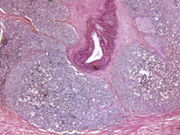PSA levels in midlife strongly predict future lethal prostate cancer risk in U.S. cohort
TUESDAY, June 14, 2016 (HealthDay News) — Prostate-specific antigen (PSA) levels in midlife predict future lethal prostate cancer (PCa) risk, according to a study published online June 13 in the Journal of Clinical Oncology.
Mark A. Preston, M.D., M.P.H., from Brigham and Women’s Hospital in Boston, and colleagues conducted a nested case-control study among men aged 40 to 59 years who gave blood before being randomized in the Physicians’ Health Study trial of aspirin and β-carotene. Baseline PSA levels were available for 234 patients with PCa and 711 controls matched for age; the authors then rematched 71 patients with lethal PCa to 213 controls.
The researchers found that for men aged 40 to 49, 50 to 54, and 55 to 59 years, the median PSA among controls was 0.68, 0.88, and 0.96 ng/mL. There was a strong correlation between the risk of lethal PCa and baseline PSA in midlife: comparing PSA in the >90th percentile versus less than or equal to median correlated with odds ratios of 8.7, 12.6, and 6.9 at 40 to 49 years, 50 to 54 years, and 55 to 59 years, respectively. For men aged 40 to 49, 50 to 54, and 55 to 59 years, a total of 82, 71, and 86 percent, respectively, of lethal cases occurred among those with PSA above the median.
“Risk-stratified screening on the basis of midlife PSA should be considered in men age 45 to 59 years,” the authors write.
Several authors disclosed financial ties to the pharmaceutical industry.
Copyright © 2016 HealthDay. All rights reserved.








